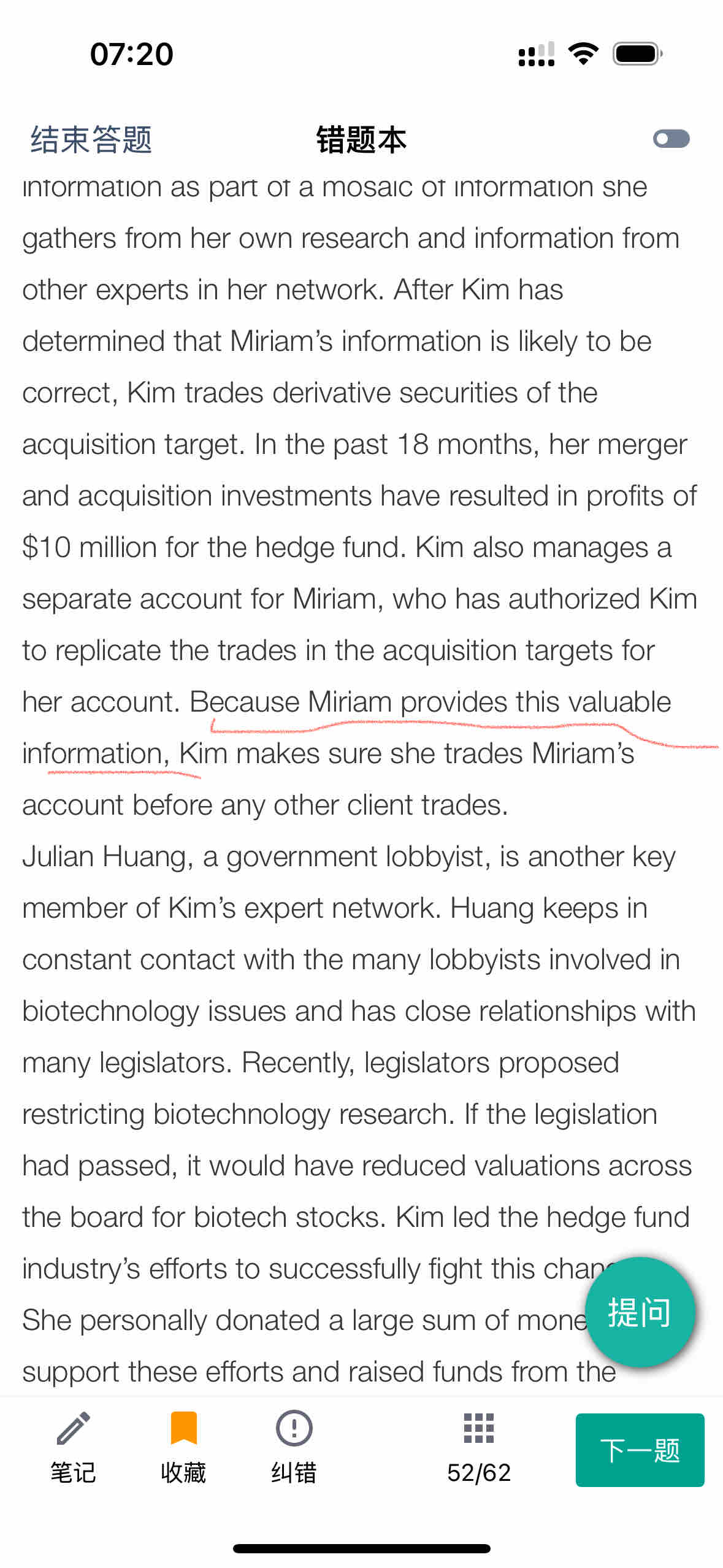NO.PZ202301190200001004
问题如下:
Sue Kim, CFA, is a hedge fund manager who specializes in biotechnology stocks. She has spent many years investing in biotech companies and formerly worked as an equity portfolio manager for a large bank with substantial research capabilities. Two years ago, Kim started a hedge fund, Green Note Investments. She also manages accounts for several wealthy individuals.
Now that she no longer has the bank’s resources to support her research, Kim relies on a network of experts to help her search for profitable investment opportunities in the biotechnology area. These experts include legal, business, and political contacts.
Kim purchases information from several biotechnology company employees, none of whom are officers of their respective companies, who perform work outside their regular positions as biotechnology consultants or experts. These consultants work with Kim without the knowledge of their employers, none of which has a prohibition on outside employment, and provide her with information about quarterly earnings and other confidential data related to their companies’ performance. Kim bases final investment decisions on this information and encourages the consultants and experts she works with to publicly disclose the information that has been passed on to her.
To spread the news about the positive returns Green Note has achieved, Kim hires a public relations consultant, Takehiko Akagi, CFA. Akagi tells Kim that for a marketing campaign to be effective, she needs a five-year return history. Kim tries to retrieve her performance history from the bank but is denied this request. Searching her home laptop computer, Kim finds her historical bank performance data. She uses the bank data to recreate the oldest two years of the requested five-year performance history. For the third year, she simulates her investment performance by applying Green Note’s current investment strategy to historical data, which she discloses in a footnote along with information about whether the performance is gross or net of fees. For the two most recent years, Kim uses Green Note’s actual performance history.
Because the marketing campaign takes longer than expected to accomplish its goal of bringing new clients to the fund, Kim asks Akagi to accept a revised fee arrangement. Instead of paying Akagi a monthly fee of $10,000 to market the fund, Kim proposes an investment management fee-sharing arrangement. For each client Akagi brings to Kim and whom she signs on as an investor in Green Note, Kim will pay Akagi a fee of 10% of the investment management fee she charges that client for their first 24 months in the fund. Akagi agrees to this arrangement, and Kim makes sure to disclose it to prospective clients by verbally telling them that Green Note compensates Akagi for his efforts to find investors for the fund, which is the first time clients are made aware of this arrangement. Akagi also discloses to each client the fee he expects to earn from this arrangement once an investment management agreement is signed.
Kim’s former university roommate, Donna Miriam, is now a legal expert in mergers and acquisitions. Miriam has a number of connections to senior associates who specialize in this area of law at large, well-known law firms. She updates Kim when she hears a deal is about to be completed. Kim uses this information as part of a mosaic of information she gathers from her own research and information from other experts in her network. After Kim has determined that Miriam’s information is likely to be correct, Kim trades derivative securities of the acquisition target. In the past 18 months, her merger and acquisition investments have resulted in profits of $10 million for the hedge fund. Kim also manages a separate account for Miriam, who has authorized Kim to replicate the trades in the acquisition targets for her account. Because Miriam provides this valuable information, Kim makes sure she trades Miriam’s account before any other client trades.
Julian Huang, a government lobbyist, is another key member of Kim’s expert network. Huang keeps in constant contact with the many lobbyists involved in biotechnology issues and has close relationships with many legislators. Recently, legislators proposed restricting biotechnology research. If the legislation had passed, it would have reduced valuations across the board for biotech stocks. Kim led the hedge fund industry’s efforts to successfully fight this change. She personally donated a large sum of money to support these efforts and raised funds from the hedge fund community to fight this proposed legislation.
Kim’s efforts to grow her fund result in new clients and rapid growth of assets under management. To bring specialized experience to her investment decision-making process, Kim uses her standardized criteria for adviser selection to hire several competent outside advisers to sit on her investment committee. Kim also subscribes to several well-known third-party research vendors, which she had not considered previously because of their high charges. With increased fees earned from additional assets under management, she can now afford to request from these vendors information tailored to her specific needs. Because this research is so specialized and detailed, and because Kim is confident the outside advisers use diligence and a reasonable basis in their research, she is able to use the reports, with a few minor changes, as her own. Kim shows her new research reports to all of her clients but makes no mention of any other changes to her investment process.
Kim’s relationship with Miriam is most consistent with the CFA Institute Standards of Professional Conduct concerning:选项:
A.Fair Dealing.
B.Priority of Transaction.
C.Material Nonpublic Information.
解释:
根据CFA Institute的《道德规范与专业行为准则》,Kim在得知 Miriam提供的信息后,会先交易 Miriam的账户,然后再进行其他客户的交易,Kim在交易执行时给予了Miriam的账户优先地位,符合Priority of Transaction标准。

为什么给了信息,却符合优先交易的规定?




